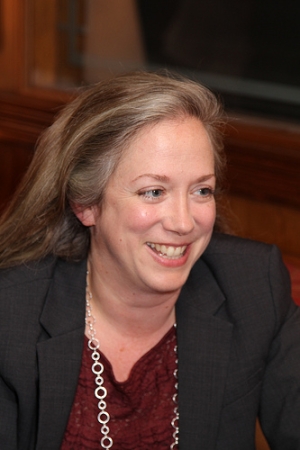Helping People with Mental Illness Get Lifesaving Medical Care
August 08, 2013 / by Paul Karon- Research
People with severe mental illness are often medically marginalized, suffering far more physical health problems than average, with life expectancies 20 to 25 years shorter, said Laura Pancake, corporate director of wellness and recovery services at Pacific Clinics, a regional provider of mental health services.
"There's a stigma toward people with serious mental illness that leads to problems like incorrect diagnoses and poor follow-up,’’ she said at a recent Southern California Clinical and Translational Science Institute Community Engagement dinner meeting, where the USC-led research teams receiving SC CTSI support presented their studies and findings.
The SC CTSI, whose mission is to speed the conversion of research into public health solutions, provides expertise and assistance that not only helps investigators at USC conduct their research but also benefits the university's neighbors throughout Los Angeles and Southern California.
To help people with mental illnesses get appropriate care, the USC School of Social Work-Pacific Clinics project focused on integrating mental and physical health care – traditionally very separate worlds. USC School of Social Work investigators, led by John Brekke, the Frances G. Larson Professor of Social Work Research, partnered with Pacific Clinics to test interventions using healthcare navigators, people who assist mental health clients by teaching them how to access and manage their own healthcare services effectively.
Holly Kiger, one of SC CTSI's research navigators, worked with researchers on this project, and her involvement is typical of the SC CTSI's role in community-engaged research. As a member of the USC research team, she assists with the training of the healthcare navigators herself. She also helped apply for additional funding to support the program, and continues to play a central role in disseminating information about it.
"Typically, researchers go into the community, collect data and then present their findings to other academics at conferences and in journals, and rarely do the people in the community have the opportunity to find out or implement the results," said Kiger. "We want community agencies and clinicians to help shape the research and then be able to apply it."
The SC CTSI Community Engagement efforts serve as a sort of research matchmaker: the team approaches community groups, clinicians and health care providers to discover their most pressing public health needs. Then they identify the right USC researchers and help the investigators shape projects, find funding, carry out the research, and ultimately implement the results in real-world solutions.
To reference the work of our faculty online, we ask that you directly quote their work where possible and attribute it to "FACULTY NAME, a professor in the USC Suzanne Dworak-Peck School of Social Work” (LINK: https://dworakpeck.usc.edu)
